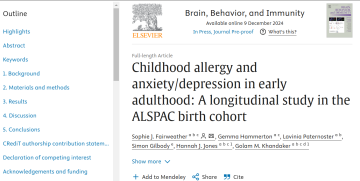Are childhood allergic conditions linked to anxiety and depression in early adulthood?
- 10 December 2024
Researchers looking at potential links between childhood allergic conditions (such as eczema, asthma and food allergies) and depression/anxiety in adolescence/early adulthood didn’t find strong evidence to confirm an association between them. The study team found that this was reflected both in blood test results and information provided by mothers about their children’s allergies.
Allergic conditions are becoming more common in children and common mental disorders often first develop in the mid-teens. However, we don’t know much about whether having an allergy as a child impacts a person’s long-term risk of developing anxiety or depression in adolescence or early adulthood.
The study team analysed data from the Avon Longitudinal Study of Parents and Children (ALSPAC) birth cohort, also known as Children of the 90s. Children of the 90s is a world-leading birth cohort study which recruited more than 14,000 pregnant women between April 1991 and December 1992. The children born to these women (and now also their grandchildren) have been followed up in detail ever since.
They team behind the current study tested associations between childhood allergic conditions at the age of seven and:
- four inflammatory markers at age nine
- depression and anxiety measures between the ages of 10 and 24
Inflammatory markers are blood tests that detect inflammation in the body. Researchers found that childhood allergies confirmed by blood tests were linked to higher levels of an inflammatory marker called IL-6.
They also confirmed that allergies and common mental disorders coincided at the age of 24. However, the research team found that childhood allergies did not have a long-term effect on subsequent depression/anxiety.
Sophie Fairweather, lead researcher, said:
“We did not find strong evidence of an association between childhood allergy and subsequent depression/anxiety in adolescence through to early adulthood.
“Future studies should consider modelling how allergies change over the course of a child’s life to understand whether the risk of depression and anxiety is different for people with persistent and severe allergies compared to those with milder or intermittent allergies.”
